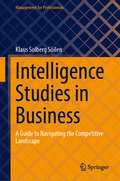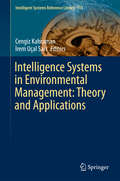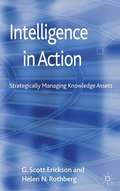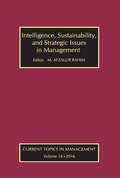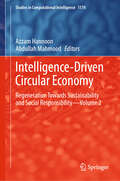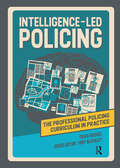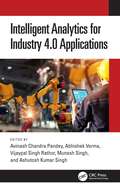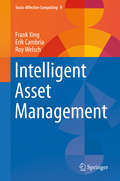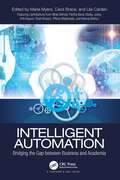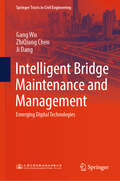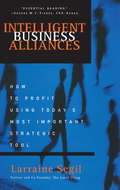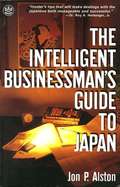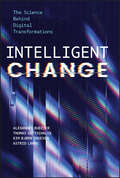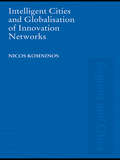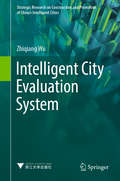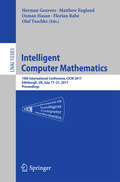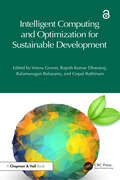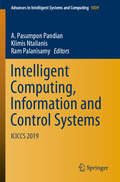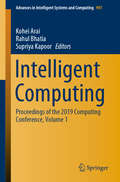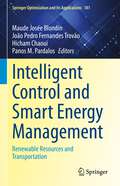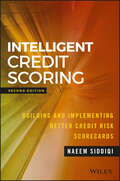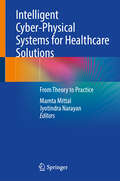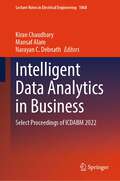- Table View
- List View
Intelligence Studies in Business: A Guide to Navigating the Competitive Landscape (Management for Professionals)
by Klaus Solberg SöilenThis book explores the evolution of intelligence research over the past two decades, emphasizing the development and implementation of intelligence functions in private and public organizations. A comprehensive framework for conducting intelligence analysis is presented, establishing and operating intelligence teams, and addressing the adjacent ethical questions raised by the nature of this field of study. The key themes addressed include the methodology of intelligence analysis, the establishment of effective intelligence teams, and the concept of "disruptive intelligence," an emerging term referring to the identification of innovations with the potential to transform industries, making products more accessible and affordable. The book argues that recognizing these disruptions early allows incumbents to protect their businesses and new entrants to capitalize on emerging opportunities. This book stands out by blending theoretical insights with practical applications, making it an essential read for those involved in intelligence, strategic planning, and innovation management.
Intelligence Systems in Environmental Management: Theory and Applications
by Cengiz Kahraman İrem Uçal SariThis book offers a comprehensive reference guide to intelligence systems in environmental management. It provides readers with all the necessary tools for solving complex environmental problems, where classical techniques cannot be applied. The respective chapters, written by prominent researchers, explain a wealth of both basic and advanced concepts including ant colony, genetic algorithms, evolutionary algorithms, fuzzy multi-criteria decision making tools, particle swarm optimization, agent-based modelling, artificial neural networks, simulated annealing, Tabu search, fuzzy multi-objective optimization, fuzzy rules, support vector machines, fuzzy cognitive maps, cumulative belief degrees, and many others. To foster a better understanding, all the chapters include relevant numerical examples or case studies. Taken together, they form an excellent reference guide for researchers, lecturers and postgraduate students pursuing research on complex environmental problems. Moreover, by extending all the main aspects of classical environmental solution techniques to its intelligent counterpart, the book presents a dynamic snapshot on the field that is expected to stimulate new directions and stimulate new ideas and developments.
Intelligence in Action
by G. Scott Erickson Helen N. RothbergFirst book to combine financial results with proprietary benchmarking data and in-depth interviews with experienced knowledge practitioners. The resulting framework provides an inside- and outside-the-firm view of the risks and opportunities found in knowledge management and competitive intelligence.
Intelligence, Sustainability, and Strategic Issues in Management: Current Topics in Management (Current Topics In Management Ser.)
by M. Afzalur RahimSocial intelligence is defined as the ability to be aware of relevant social situational contexts; to deal with the contexts or challenges effectively; to understand others' concerns, feelings, and emotional states; and to interact appropriately in social situations and build and maintain positive relationships with others. Intelligence, Sustainability, and Strategic Issues in Management analytically discusses this concept within administrative and entrepreneurial managerial business environments.The volume opens with a study of academic department chairs' social intelligence and faculty members' satisfaction with annual evaluation of teaching and research at a US university. The seven other articles cover a range of topics, including a neurocognitive model of entrepreneurial opportunity, ownership dilution, sustainability in inventory management, the role of status in imitative behaviour, the negative impacts of embeddedness, product quality failures in international sourcing, and employers' use of social media in employment decisions.In addition to the articles, the volume also features a case study, "From Social Entrepreneur to Social Enterprise," a research note, "Reducing Job Burnout through Effective Conflict Management Strategy," five book reviews, and a list of books received.
Intelligence-Driven Circular Economy: Regeneration Towards Sustainability and Social Responsibility—Volume 2 (Studies in Computational Intelligence #1174)
by Azzam Hannoon Abdullah MahmoodThis book provides a platform for scholars and researchers to present the latest insights and findings on the role of artificial intelligence and smart digital solutions in fostering the circular economy. Additionally, the book shades the lights on the vital role of circular economy in achieving sustainability and social responsibility. It covers a variety of research topics including circular economy, sustainability, AI applications, legislation and regulation, smart cities, social entrepreneurship and AI, digital transformation, knowledge management, and cybersecurity. This edited book serves as a reference and guide to graduate students, researchers, and academics conducting research and taking courses in artificial intelligence, sustainability, and the circular economy.
Intelligence-led Policing (The Professional Policing Curriculum in Practice)
by Craig HughesIntelligence-led Policing clearly explains the distinction between information and intelligence, and discusses how to gather, analyse and utilise intelligence to inform decision making in practice. It relates all areas of intelligence within the investigative process and contextualises its use in line with the National Intelligence Model (NIM) as part of routine working practice. It develops a knowledge base by identifying six tiers of policing intelligence architecture, exploring the concept of intelligence as it applies to strategic, tactical and practice levels of operational policing. A great mix of theory and practice to help students explore how information can become useful intelligence including the process through which it goes and the importance of intervention points.The Professional Policing Curriculum in Practice is a new series of books that match the requirements of the new pre-join policing qualifications. The texts reflect modern policing, are up-to-date and relevant, and grounded in practice. They reflect the challenges faced by new students, linking theory to real-life operational practice, while addressing critical thinking and other academic skills needed for degree-level study.
Intelligent Analytics for Industry 4.0 Applications
by Abhishek Verma Ashutosh Kumar Singh Avinash Chandra Pandey Vijaypal Singh Rathor Munesh SinghThe advancements in intelligent decision-making techniques have elevated the efficiency of manufacturing industries and led to the start of the Industry 4.0 era. Industry 4.0 is revolutionizing the way companies manufacture, improve, and distribute their products. Manufacturers are integrating new technologies, including the Internet of Things (IoT), cloud computing and analytics, and artificial intelligence and machine learning, into their production facilities throughout their operations. In the past few years, intelligent analytics has emerged as a solution that examines both historical and real-time data to uncover performance insights. Because the amount of data that needs analysis is growing daily, advanced technologies are necessary to collect, arrange, and analyze incoming data. This approach enables businesses to detect valuable connections and trends and make decisions that boost overall performance. In Industry 4.0, intelligent analytics has a broader scope in terms of descriptive, predictive, and prescriptive subdomains. To this end, the book will aim to review and highlight the challenges faced by intelligent analytics in Industry 4.0 and present the recent developments done to address those challenges.
Intelligent Asset Management (Socio-Affective Computing #9)
by Erik Cambria Frank Xing Roy WelschThis book presents a systematic application of recent advances in artificial intelligence (AI) to the problem of asset management. While natural language processing and text mining techniques, such as semantic representation, sentiment analysis, entity extraction, commonsense reasoning, and fact checking have been evolving for decades, finance theories have not yet fully considered and adapted to these ideas.In this unique, readable volume, the authors discuss integrating textual knowledge and market sentiment step-by-step, offering readers new insights into the most popular portfolio optimization theories: the Markowitz model and the Black-Litterman model. The authors also provide valuable visions of how AI technology-based infrastructures could cut the cost of and automate wealth management procedures.This inspiring book is a must-read for researchers and bankers interested in cutting-edge AI applications in finance.
Intelligent Automation: Bridging the Gap between Business and Academia
by Marie Myers Carol Brace Lila CardenSince prehistoric times, humans have invented ways to simplify daily activities to improve productivity. The most recent milestone in this journey is robotic process automation (RPA), helping to build software robots that can be leveraged to automate mundane and repetitive tasks that can be labor-intensive and prone to errors. In recent years, RPA has been integrated with emerging artificial intelligence (AI) and machine learning (ML) technologies to create what is referred to as intelligent automation (IA), emulating human actions and decision-making abilities. This book addresses the critical questions about the rise, usage, and future of IA practices. This book is structured by general personas considered as its primary target audience, ranging from: Early-stage practitioners seeking to learn effective management of IA programs Established IA practitioners seeking to drive maturity and scale Business leaders seeking to understand how to drive business value using IA Practitioners or academicians seeking to collaborate This book is strongly recommended for practitioners seeking to plan, implement, and scale IA practices in their organization and for researchers and students who intend to study strategy, implementation, and management of IA practice to accelerate the digital transformation agenda.
Intelligent Bridge Maintenance and Management: Emerging Digital Technologies (Springer Tracts in Civil Engineering)
by Gang Wu Ji Dang ZhiQiang ChenThis book provides a timely introduction to the methodology of Intelligent Bridge Maintenance and Management (IBM&M) and a comprehensive synthesis of emerging digital technologies for realizing IBM&M. The authors, who carry research, teaching, and consulting experience in the USA, Japan, and China, present the background, principles, methods, and application examples of essential IBM&M solutions in eight dedicated chapters. The digital technologies covered in this book include: • Artificial intelligence, big data, machine learning, computer vision. • Data fusion, 3D building information, digital twin modeling, virtual and augmented reality. • Internet of things sensors, robotics including unmanned vehicles. The book targets the audience in the broader Bridge Engineering community, including academic researchers, students, bridge owners, and technology providers.
Intelligent Business Alliances: How to Profit Using Today's Most Important Strategic Tool
by Larraine D. SegilAlliances between companies have become a major competitive tool, allowing companies to exploit their complementary. However, many comapnies mishandle their alliances, wasting money, time, and effort. Now, international business consultant Larraine D. Segil shows how to establish and manage profitable alliances. "A breakthrough."--Bestselling business author Ken Blanchard.
Intelligent Businessman's Guide to Japan
by Jon P Alston"Insider's tips that will make dealings with the Japanese both manageable and sucessful." --Dr. Roy A. Herberger, Jr.For Westerners dealing with Japanese, simple differences in business practices can be troublesome obstacles to successful negotiation. They need not be according to sociologist Jon P. Alston. In this informed and straightforward presentation, Alston describes common Japanese rules for social interaction, and shows how foreigners who understand them can put this knowledge to profitable use. In such chapters as: Establishing a Personal Relationship Closing the Deal Maintaining Contact Alston explains Japanese expectations and the importance placed on preperation, form, and follow-up. For those planning their first interculturual deal as well as for experienced negociations, The Intelligent Businessman's Guide to Japan is an invaluable aid for acquiring the extra edge that leads to business success.
Intelligent Businessman's Guide to Japan
by Jon P Alston"Insider's tips that will make dealings with the Japanese both manageable and sucessful." --Dr. Roy A. Herberger, Jr.For Westerners dealing with Japanese, simple differences in business practices can be troublesome obstacles to successful negotiation. They need not be according to sociologist Jon P. Alston. In this informed and straightforward presentation, Alston describes common Japanese rules for social interaction, and shows how foreigners who understand them can put this knowledge to profitable use. In such chapters as: Establishing a Personal Relationship Closing the Deal Maintaining Contact Alston explains Japanese expectations and the importance placed on preperation, form, and follow-up. For those planning their first interculturual deal as well as for experienced negociations, The Intelligent Businessman's Guide to Japan is an invaluable aid for acquiring the extra edge that leads to business success.
Intelligent Change: The Science Behind Digital Transformations
by Alexander Budzier Thomas Gottschalck Kim Bjørn Thuesen Astrid LanngShepherd your firm through its next digital transformation initiative Only 1 in 200 digital transformations finish on time, within budget, and realize the planned benefits. To avoid the same fate, you must understand why so many fail, and some succeed. In Intelligent Change: The Science Behind Digital Transformations, a team of renowned project management and digital transformation experts delivers a how-to manual for expansive technology change initiatives at firms of all types and sizes. The authors rely on a systematic review of over 1800 publications, interviews with 160 top-level managers, and fieldwork studying 150 digital transformation projects to bring you research- and data-backed strategies you can implement at your own organization to ensure your own project provides business value. Learn what strategies work and why. Understand which strategies don't work and what pitfalls to avoid. You'll find step-by-step guidance on how to execute a digital transformation using the keys to successful change initiatives, including: Establishing ownership amongst your front-line managers and staff that goes beyond mere support and promotion of the change Building trusting relationships between the different levels of your organization Creating effective two-way communication between the planners of the technology change and the ground-level staff implementing it Perfect for managers, executives, entrepreneurs, founders, and other business leaders, Intelligent Change is also a must-read for project managers and IT professionals tasked with shepherding their companies through their next major technological change.
Intelligent Cities and Globalisation of Innovation Networks (Regions And Cities Ser.)
by Nicos KomninosIntelligent Cities and Globalisation of Innovation Networks combines concepts and theories from the fields of urban development and planning, innovation management, and virtual / intelligent environments. It explains the rise of intelligent cities with respect to the globalisation of systems of innovation; opens up a new way for making intelli
Intelligent City Evaluation System (Strategic Research on Construction and Promotion of China's Intelligent Cities)
by Zhiqiang WuThis book assesses various intelligent-city evaluation systems around the globe, and subsequently combines that assessment with local-government and enterprise practices to create an evaluation index system for quantifying the Intelligent City concept. In addition, the book provides the results of the CityIQ indicator ranking of intelligent cities in China and worldwide, a system that focuses on three of the most crucial aspects of urban development: the development environment, future trends, and construction and operation. After data sorting, calculation and dimensionless treatment, a score system ranging from 0 to 100 is created for ranking and analyzing cities. Providing unique strategies for promoting an intelligent city evaluation system, the book offers a valuable reference guide for intelligent-city decision-makers, as well as leaders in public urban economy, social welfare and environmental authorities.
Intelligent Computer Mathematics
by Herman Geuvers Florian Rabe Matthew England Osman Hasan Olaf TeschkeThis book constitutes the joint refereed proceedings of three international events, namely the 18th Symposium on the Integration of Symbolic Computation and Mechanized Reasoning, Calculemus 2011, the 10th International Conference on Mathematical Knowledge Management, MKM 2011, and a new track on Systems and Projects descriptions that span both the Calculemus and MKM topics, all held in Bertinoro, Italy, in July 2011. All 51 submissions passed through a rigorous review process. A total of 15 papers were submitted to Calculemus, of which 9 were accepted. Systems and Projects track 2011 there have been 12 papers selected out of 14 submissions while MKM 2011 received 22 submissions, of which 9 were accepted for presentation and publication. The events focused on the use of AI techniques within symbolic computation and the application of symbolic computation to AI problem solving; the combination of computer algebra systems and automated deduction systems; and mathematical knowledge management, respectively.
Intelligent Computing and Optimization for Sustainable Development
by Balamurugan Balusamy Rajesh Kumar Dhanaraj Veena Grover Gopal RathinamThis book presents insights into how Intelligent Computing and Optimization techniques can be used to attain the goals of Sustainable Development. It provides a comprehensive overview of the latest breakthroughs and recent developments in sustainable, intelligent computing technologies, applications, and optimization techniques across various industries, including business process management, manufacturing, financial sector, agriculture, financial sector, supply chain management, and healthcare. It focuses on computational intelligent techniques and optimization techniques to provide sustainable solutions to many problems. Features: Provides insights into the theory, implementation, and application of computational intelligence techniques in many industries Includes industry practitioner perspectives and case studies for a better understanding of sustainable solutions Highlights the role of intelligent computing and optimization as key technologies in decision-making processes and in providing cutting-edge solutions to real-world problems Addresses the challenges and limitations of computational approaches in sustainability, such as data availability, model uncertainty, and computational complexity, while also discusses emerging opportunities and future directions in the field This book will be useful for professionals and scholars looking for up-to-date research on cutting-edge perspectives in the field of computational intelligent and optimization techniques in the areas of agriculture, industry, financial sector, business automation, renewable energy, optimization, and smart cities.
Intelligent Computing, Information and Control Systems: ICICCS 2019 (Advances in Intelligent Systems and Computing #1039)
by Klimis Ntalianis A. Pasumpon Pandian Ram PalanisamyFrom past decades, Computational intelligence embraces a number of nature-inspired computational techniques which mainly encompasses fuzzy sets, genetic algorithms, artificial neural networks and hybrid neuro-fuzzy systems to address the computational complexities such as uncertainties, vagueness and stochastic nature of various computational problems practically. At the same time, Intelligent Control systems are emerging as an innovative methodology which is inspired by various computational intelligence process to promote a control over the systems without the use of any mathematical models. To address the effective use of intelligent control in Computational intelligence systems, International Conference on Intelligent Computing, Information and Control Systems (ICICCS 2019) is initiated to encompass the various research works that helps to develop and advance the next-generation intelligent computing and control systems. This book integrates the computational intelligence and intelligent control systems to provide a powerful methodology for a wide range of data analytics issues in industries and societal applications. The recent research advances in computational intelligence and control systems are addressed, which provide very promising results in various industry, business and societal studies. This book also presents the new algorithms and methodologies for promoting advances in common intelligent computing and control methodologies including evolutionary computation, artificial life, virtual infrastructures, fuzzy logic, artificial immune systems, neural networks and various neuro-hybrid methodologies. This book will be pragmatic for researchers, academicians and students dealing with mathematically intransigent problems. It is intended for both academicians and researchers in the field of Intelligent Computing, Information and Control Systems, along with the distinctive readers in the fields of computational and artificial intelligence to gain more knowledge on Intelligent computing and control systems and their real-world applications.
Intelligent Computing: Proceedings of the 2019 Computing Conference, Volume 1 (Advances in Intelligent Systems and Computing #997)
by Kohei Arai Supriya Kapoor Rahul BhatiaThis book presents the proceedings of the Computing Conference 2019, providing a comprehensive collection of chapters focusing on core areas of computing and their real-world applications. Computing is an extremely broad discipline, encompassing a range of specialized fields, each focusing on particular areas of technology and types of application, and the conference offered pioneering researchers, scientists, industrial engineers, and students from around the globe a platform to share new ideas and development experiences. Providing state-of-the-art intelligent methods and techniques for solving real- world problems, the book inspires further research and technological advances in this important area.
Intelligent Control
by Alan Hall Willem De LintMassive public protests have had a prominent presence at the turn of the millennium, with many thousands of protestors controlled by small, yet, increasingly specialized police forces. Investigating the ways in which police practices have evolved in relation to labour strikes and protests, Intelligent Control examines the means by which police forces have developed more coercive and consent-based approaches to regulating social unrest. Willem de Lint and Alan Hall argue that police forces have been gradually adapting public order operations to match or reflect wider trends in politics and society. The main such development is the enfolding of neoliberalism. Police and labour and protester adaptations have followed a fine line between legitimacy and illegitimacy, consent and coercion. The authors explore the development of consent policing from its roots in labour strike countering and the emergence of what they call 'intelligent control' from expanded covert, intelligence-gathering operations. A concise study of how police practices changed from the 1960s to the present day, Intelligent Control is an informative account of a revolution in modern policing.
Intelligent Control and Smart Energy Management: Renewable Resources and Transportation (Springer Optimization and Its Applications #181)
by Panos M. Pardalos Maude Josée Blondin João Pedro Fernandes Trovão Hicham ChaouiThis volume aims to provide a state-of-the-art and the latest advancements in the field of intelligent control and smart energy management. Techniques, combined with technological advances, have enabled the deployment of new operating systems in many engineering applications, especially in the domain of transport and renewable resources. The control and energy management of transportation and renewable resources are shifting towards autonomous reasoning, learning, planning and operating. As a result, these techniques, also referred to as autonomous control and energy management, will become practically ubiquitous soon. The discussions include methods, based on neural control (and others) as well as distributed and intelligent optimization. While the theoretical concepts are detailed and explained, the techniques presented are tailored to transport and renewable resources applications, such as smart grids and automated vehicles. The reader will grasp the most important theoretical concepts as well as to fathom the challenges and needs related to timely practical applications. Additional content includes research perspectives and future direction as well as insight into the devising of techniques that will meet tomorrow’s scientific needs. This contributed volume is for researchers, graduate students, engineers and practitioners in the domains of control, energy, and transportation.
Intelligent Credit Scoring: Building and Implementing Better Credit Risk Scorecards (Second Edition) (Wiley And Sas Business Ser. #3)
by Naeem SiddiqiIntelligent Credit Scoring presents a business-oriented process for the development and implementation of risk prediction scorecards. The credit scorecard is a powerful tool for measuring the risk of individual borrowers, gauging overall risk exposure and developing analytically driven, risk-adjusted strategies for existing customers. In the past 10 years, hundreds of banks worldwide have brought the process of developing credit scoring models in-house, while ‘credit scores' have become a frequent topic of conversation in many countries where bureau scores are used broadly. In the United States, the ‘FICO' and ‘Vantage' scores continue to be discussed by borrowers hoping to get a better deal from the banks. While knowledge of the statistical processes around building credit scorecards is common, the business context and intelligence that allows you to build better, more robust, and ultimately more intelligent, scorecards is not. As the follow-up to Credit Risk Scorecards, this updated second edition includes new detailed examples, new real-world stories, new diagrams, deeper discussion on topics including WOE curves, the latest trends that expand scorecard functionality and new in-depth analyses in every chapter. Expanded coverage includes new chapters on defining infrastructure for in-house credit scoring, validation, governance, and Big Data. Black box scorecard development by isolated teams has resulted in statistically valid, but operationally unacceptable models at times. This book shows you how various personas in a financial institution can work together to create more intelligent scorecards, to avoid disasters, and facilitate better decision making. Intelligent Credit Scoring helps you organise resources, streamline processes, and build more intelligent scorecards that will help achieve better results.
Intelligent Cyber-Physical Systems for Healthcare Solutions: From Theory to Practice
by Mamta Mittal Jyotindra NarayanThis book widens the insights with the advent of data-driven techniques using intelligent Cyber-Physical Systems to monitor and diagnose patients, provide personalized treatments, and enhance the overall quality of care. Intelligent Cyber-Physical Systems for healthcare solutions is an emerging area of research that aims to integrate advanced technologies, such as sensors, actuators, artificial intelligence, and the Internet of things, with healthcare systems to improve patient outcomes. This book provides an overview of the state-of-the-art in this field, showcasing the latest advances in cyber-physical systems design and implementation—the challenges and opportunities in applying CPS to healthcare. The book covers various aspects of intelligent cyber-physical systems in healthcare, including architecture, communication protocols, data processing, monitoring, diagnosis, rehabilitation, and assistive technologies. It also addresses important issues such as security, privacy, and ethics considerations and presents best practices for ensuring the safety and reliability of CPS in healthcare. The book offers a valuable resource for researchers, practitioners, and students to transform healthcare and improve patient outcomes while highlighting the need for interdisciplinary collaboration and ethical considerations in its design and implementation.
Intelligent Data Analytics in Business: Select Proceedings of ICDABM 2022 (Lecture Notes in Electrical Engineering #1068)
by Narayan C. Debnath Mansaf Alam Kiran ChaudharyThis book includes peer-reviewed contributions presented at the International Conference on Data Analytics in Business and Marketing, ICDABM 2022. The book covers topics in data analytics, intelligent data, data management in business and marketing, big data, computational intelligence, and communication networks. The book presents innovative work by leading academics, researchers, and experts from the industry, which is helpful for young researchers and students.
